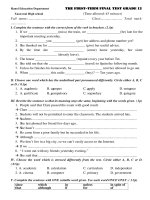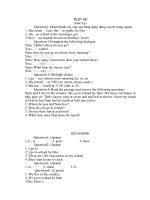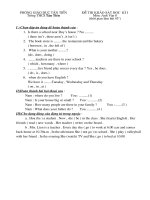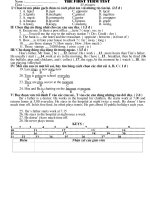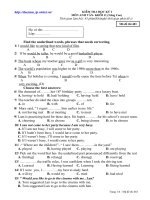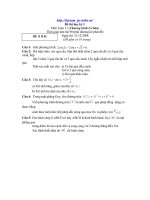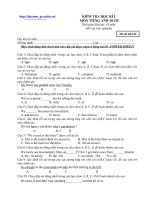- Trang chủ >>
- Mầm non - Tiểu học >>
- Lớp 1
De thi HK Anh11 so 2
Bạn đang xem bản rút gọn của tài liệu. Xem và tải ngay bản đầy đủ của tài liệu tại đây (100.18 KB, 2 trang )
<span class='text_page_counter'>(1)</span><div class='page_container' data-page=1>
<b>ĐỀ THI HỌC KỲ I</b>
<b>MÔN : TIẾNG ANH</b>
<i>Thời gian làm bài: 45 phút.</i>
<i>(Lưu ý:Học sinh làm bài trên phiếu trả lời</i>
<i>trắc nghiệm)</i>
<b>Mã đề thi 458</b>
Họ, tên thí sinh:... Số báo danh:...
<i><b>Chọn từ (ứng với A, B, C hoặc D) có phần gạch dưới được phát âm khác với những từ còn lại </b></i>
<i><b>trong mỗi câu sau:</b></i>
<b>Câu 1: A. </b>view<b>ed</b> <b>B. </b>measur<b>ed</b> <b>C. </b>confid<b>ed</b> <b>D. </b>shar<b>ed</b>
<b>Câu 2: A. </b>secret<b>s</b> <b>B. </b>weekend<b>s</b> <b>C. </b>problem<b>s</b> <b>D. </b>brother<b>s</b>
<b>Câu 3: A. </b>advis<b>ed</b> <b>B. </b>practic<b>ed</b> <b>C. </b>rais<b>ed</b> <b>D. </b>devis<b>ed</b>
<b>Câu 4: A. </b>boy<b>s</b> <b>B. </b>hand<b>s</b> <b>C. </b>chore<b>s</b> <b>D. </b>parent<b>s</b>
<i><b>Chọn từ (ứng với A, B, C hoặc D) có trọng âm chính nhấn vào âm tiết có vị trí khác với những từ </b></i>
<i><b>cịn lại trong mỗi câu sau:</b></i>
<b>Câu 5:</b> <b>A. </b>terrorist <b>B. </b>domestic <b>C. </b>different <b>D. </b>contrary
<b>Câu 6: A. </b>development <b>B. </b>particular <b>C. </b>pessimistic <b>D. </b>security
<b>Câu 7: A. </b>device <b>B. </b>certain <b>C. </b>burden <b>D. </b>future
<b>Câu 8: A. </b>threaten <b>B. </b>instance <b>C. </b>modern <b>D. </b>appear
<i><b>Chọn từ/cụm từ thích hợp (ứng với A, B, C hoặc D) để hoàn thành mỗi câu sau:</b></i>
<b>Câu 9:</b> She intended to quit her job to stay _______ home and look _______ her sick mother.
<b>A. </b>up / on <b>B. </b>at / after <b>C. </b>in / at <b>D. </b>for / over
<b>Câu 10:</b> All bottles _______ before transportation.
<b>A. </b>are froze <b>B. </b>frozen <b>C. </b>were froze <b>D. </b>were frozen
<b>Câu 11:</b> John asked me _______ interested in any kind of sports.
<b>A. </b>if I was <b>B. </b>if I were <b>C. </b>if was I <b>D. </b>if were I
<b>Câu 12:</b> When Carol _______ last night, I _______ my favorite show on television.
<b>A. </b>was calling / watched <b>B. </b>called / have watched
<b>C. </b>had called / watched <b>D. </b>called / was watching
<b>Câu 13:</b> _______ her lack of hard work, she was promoted.
<b>A. </b>Even though <b>B. </b>In spite <b>C. </b>Despite of <b>D. </b>In spite of
<b>Câu 14:</b> Japanese _______ at the meeting.
<b>A. </b>will spoken <b>B. </b>will be speaking <b>C. </b>will speak <b>D. </b>will be spoken
<b>Câu 15:</b> If she _______ the train last night, she _______ here now.
<b>A. </b>were taking / is <b>B. </b>took / were
<b>C. </b>had taken / would have been <b>D. </b>had taken / would be
<b>Câu 16:</b> While I am waiting _______ my bus, I often listen _______ music.
<b>A. </b>upon / in <b>B. </b>toward / about <b>C. </b>for / to <b>D. </b>on / at
<b>Câu 17:</b> _______ Tom Cruise’s last movie? Yes, I _______ it three days ago.
<b>A. </b>Will you ever see / saw <b>B. </b>Had you ever seen / would see
<b>C. </b>Have you ever seen / saw <b>D. </b>Did you ever see / have seen
<b>Câu 18:</b> School uniform is compulsory in most of Vietnamese schools.
<b>A. </b>required <b>B. </b>depended <b>C. </b>paid <b>D. </b>divided
<b>Câu 19:</b> Oranges _______ rich in vitamin C, which _______ good for our health.
<b>A. </b>were / has been <b>B. </b>are/ will be <b>C. </b>have been / is <b>D. </b>are / is
<b>Câu 20:</b> If I _______ 10 years younger, I _______ the job.
<b>A. </b>were / would take <b>B. </b>had been / will have taken
<b>C. </b>was / have taken <b>D. </b>am / will take
</div>
<span class='text_page_counter'>(2)</span><div class='page_container' data-page=2>
<b>A. </b>know <b>B. </b>knew <b>C. </b>could know <b>D. </b>had known
<b>Câu 22:</b> He asked _______ him some money.
<b>A. </b>her to lend <b>B. </b>she to lend <b>C. </b>she has lent <b>D. </b>she lends
<b>Câu 23:</b> He is the man _______ car was stolen last week.
<b>A. </b>that <b>B. </b>whom <b>C. </b>whose <b>D. </b>which
<i><b>Đọc kỹ đoạn văn sau và chọn phương án đúng (ứng với A, B, C hoặc D) cho mỗi chỗ trống:</b></i>
What sort of job should you look for? Much depends (24)_____ your long-term aim. You need to
ask (25)_____ whether you want to specialize in a particular field, work your way up to higher levels
of responsibility or (26)_____ of your current employment into a broader field.
This job will be studied very carefully when you send your letter of (27)_____ for your next job. It
(28)_____ show evidence of serious career planning. Most important, it should extend you, develop
you and give you increasing responsibility. Incidentally, if the travel bug is biting, (29)_____ is he
time to pack up and go. You can do temporary work for a (30)_____; when you return, pick up where
you have (31)_____ off and get the second job.
<b>24.A.</b> for <b>B.</b> on <b>C.</b> of <b>D.</b> with
<b>25.A.</b> you <b>B.</b> if <b>C.</b> oneself <b>D.</b> yourself
<b>26.A.</b> out <b>B.</b> off <b>C.</b> into <b>D.</b> over
<b>27.A.</b> applicants <b>B.</b> application <b>C.</b> form <b>D.</b> employment
<b>28.A.</b> will <b>B.</b> would <b>C.</b> should <b>D.</b> may
<b>29.A.</b> now <b>B.</b> then <b>C.</b> so <b>D.</b> such
<b>30. A.</b> day <b>B.</b> time <b>C.</b> while <b>D.</b> ages
<b>31.A.</b> came <b>B.</b> left <b>C.</b> taken <b>D.</b> paid
<i><b>Đọc kỹ đoạn văn sau và chọn phương án đúng (ứng với A, B, C hoặc D) cho mỗi câu trả lời:</b></i>
About a hundred years ago, Zamenhof invented a new language called Esperanto to improve
understanding between people of different countries. He showed Esperanto to his friends to find out
what they thought about it. Later in the same year he went to study at a university in Moscow. He
wanted to improve Esperanto. Zamenhof’s friends then worked hard to spread the new language.
They tried to persuade schools throughout the world to teach it. However, only a few people today
speak Esperanto because more and more people use English as a foreign language.
<b>Câu 32.</b> When was the language called Esperanto invented?
<b> A.</b> About 10 years ago. <b>B.</b> About 1000 years ago.
<b> C.</b> About a century ago <b>D.</b> In 100 years’ time.
<b>Câu 33.</b> Esperanto was intended for _______.
<b> A.</b> people speaking different languages. <b>B.</b> understanding countries.
<b> C.</b> people from the same country. <b>D.</b> English speakers only.
<b>Câu 34.</b> What did he show Esperanto to his friends for?
<b> A.</b> To ask them to think about it. <b>B.</b> To improve it.
<b> C.</b> To spread the language. <b>D.</b> To know their opinions about it.
<b>Câu 35.</b> Zamenhof and his friends worked hard _______.
<b> A.</b> to invent the language. <b>B.</b> to teach it.
<b> C.</b> to make it an international language. <b>D.</b> to speak it.
<i><b>Chọn phương án A, B, C hoặc D ứng với từ hoặc cụm từ có gạch dưới cần phải sửa để trở thành </b></i>
<i><b>chính xác: </b></i>
<b>Câu 36. </b>Because of the rise in unemployment, people still seem to be spending more.
<b>A</b> <b> B</b> <b> C D</b>
<b>Câu 37. </b>I need the book whom I lent you last week.
<b>A B</b> <b> C D</b>
<b>Câu 38.</b> If I were you, I didn’t buy that old building.
<b> A</b> <b> B C</b> <b> D</b>
<b>Câu 39. </b>“How long have you work here?” my friend asked.
<b> A</b> <b> B</b> <b> C</b> <b> D</b>
</div>
<!--links-->
